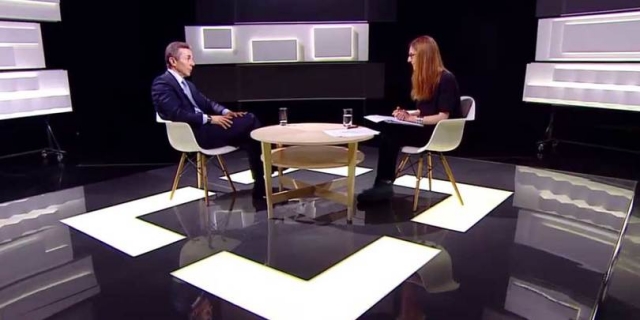Georgia’s Billionaire Former PM Denies Grey Cardinal Claim
TBILISI – Georgia’s eccentric billionaire former Prime Minister Bidzina Ivanishvili said in a Thursday interview with Radio Liberty’s Georgia’s service that he wields no influence over any of the members of the current government.
Ivanishvili, the founder of the ruling Georgian Dream coalition, did admit to having frequent consultations with certain sitting government members but said none of the meetings could be described as his ability to influence policy.
“I have no special status. I am just an ordinary citizen that poses no threat to the country…As for the question of power, my power rests in the fact that people trust me and appreciate my words,” Ivanishvili said.
Despite his leaving politics in 2013, most in Georgia still believe he holds enormous influence over the current government. Ivanishvili flatly rejected the rumors but confirmed that he took part in former Prime Minister Irakli Garibashvili’s decision to resign abruptly in December 2015.
“Garibashvili asked, and I gave him my opinion. He came to me more than once and I told him it wouldn’t be a bad idea to go,’ Ivanishvili said.
When the conversation turned to Georgia’s relations with Russia, Ivanishvili said the country must have constructive relations with Moscow, despite the fact Russia’s armed forces occupy more than 20 percent of Georgia’s territory.
Unlike his predecessor, staunchly pro-Western former President Mikheil Saakashvili, Ivanishvili has taken a far friendlier and conciliatory tone toward Russia since Georgian Dream took power.
The move towards warmer relations with Moscow has drawn sharp criticism from many sectors of Georgian society, particularly after the Georgian government entered into negotiations with Russian gas giant Gazprom over energy supplies.
The recent influx of Kremlin-controlled news agencies in Georgia have heightened the fears of many Georgian citizens who worry that Ivanishvili and the Georgian Dream have allowed Russia to exert its form of soft power over the country through the media and energy-related coercion.
He was quick to emphasize that Georgia would eventually join both NATO and the European Union but seemed to suggest that Georgia would have to acquiesce to Russia’s objections until Moscow no longer felt threatened by Georgia’s Western aspirations.
"We must patiently strengthen our democratic institutions, we must make our economy flourish and wait for the right time when Russia realizes, and when our allies see, that it's time for Georgia to become a member of NATO and the EU," Ivanishvili said in the televised interview.
“Georgia’s ambitions do not contradict Russia's interests, although the current Russian leadership considers our move towards the West to be a threat."
Ivanishvili, who rarely grants interviews and is known for temperamental outbursts towards those who publicly criticize him, seemed to grow angry and impatient at the journalist’s critical questions.
Dogged by accusations that he harbors pro-Russian sympathies, Ivanishvili continually chastised the journalist for not having thoroughly read through his recently published 25-page letter to the public that gave an exhaustive and excessively positive account of the Georgian Dream’s accomplishments since they came to power four years.
The 60-year old billionaire oligarch was born into poverty in Georgia’s western Imereti region but spent most of his life in Moscow. Following the collapse of the Soviet Union in the early 1990s, he accumulated vast amounts of wealth in the banking and mining industries.
After returning to Georgia in the mid-2000s, Ivanishvili later transformed his wealth into political clout when he founded the ruling Georgian Dream party in 2011. A year later, the party unseated the country’s pro-Western former president Mikheil Saakashvili.
Following the Georgian Dream’s victory at the polls, Ivanishvili briefly served as the country’s prime minister in 2012-2013, before stepping down and retiring from politics.
Now worth USD 5.5 billion, his fortune amounts to half of Georgia’s gross domestic product. He has consistently drawn the ire of Georgian citizens for his extravagant lifestyle. Ivanishvili’s USD 60 million glass and steel Tbilisi palace that houses a USD 1 billion private art collection contrasts sharply with the realities of most Georgians who struggle to make ends meet on as little as USD 100 per month.
By Tamar Svanidze
Edited by Nicholas Waller












